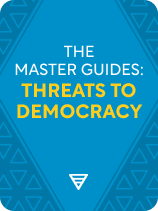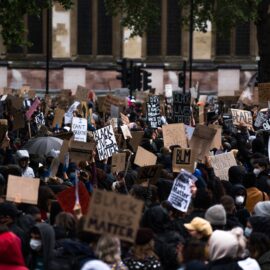

This article is an excerpt from the Shortform book guide to "The Master Guides: Threats to Democracy" by Shortform. Shortform has the world's best summaries and analyses of books you should be reading.
Like this article? Sign up for a free trial here.
Are democratic norms truly essential for a healthy political system? What happens when these unwritten rules start to crumble?
The decline of democratic standards is a threat to the idea of democracy itself. How Democracies Die by Steven Levitsky and Daniel Ziblatt explores the concepts of mutual toleration and institutional forbearance, which they argue are necessary for democratic systems to survive.
Continue reading to discover how these crucial democratic norms shape political conduct and why their erosion could spell trouble for democracy as we know it.
Decline of Democratic Standards
In How Democracies Die, authors Steven Levitsky and Daniel Ziblatt write about the importance of political norms—the unwritten rules that govern political conduct. The authors contend that these democratic standards provide the best protection for democracy by establishing a broadly accepted benchmark of what is and isn’t acceptable behavior.
The authors write that it’s useful to think of standards as the guardrails that prevent political competition from getting too intense or the stakes of elections from getting too high and turning every election into a winner-take-all, win-at-all-costs battle. In a healthy democratic system, politicians respect standards by not engaging in acts of extreme aggression against their opponents—even if such conduct would technically be legal.
Levitsky and Ziblatt identify mutual toleration and institutional forbearance as two standards that act as strong linchpins for democracy—and explain why the withering of either one can signal democracy’s demise.
1) Mutual Toleration
The first norm Levistsky and Ziblatt identify is mutual toleration. Mutual toleration means accepting the legitimacy of one’s political opponents and acknowledging their right to govern, as long as they win in free and fair elections—regardless of ideological differences. Without mutual toleration, warn Levitsky and Ziblatt, opponents may feel that they’re justified in taking extraordinary steps to keep their enemies from attaining power.
Zimbabwe in the early 2000s provides an example of what can happen when political actors abandon mutual toleration. In 2000, the political landscape in Zimbabwe became increasingly contentious, particularly between President Robert Mugabe’s ruling ZANU-PF party and the opposition Movement for Democratic Change (MDC) led by Morgan Tsvangirai. The elections during this period were marred by allegations of electoral fraud, violence, and intimidation.
The refusal by President Mugabe and his party to accept the legitimacy of the opposition, coupled with accusations of election rigging, eroded mutual toleration. The disputed elections and the contentious political environment led to a series of extraordinary steps, including the violent suppression of political dissent—culminating in the arrest of opposition leaders, including Tsvangirai.
2) Institutional Forbearance
The second norm Levitsky and Ziblatt identify is institutional forbearance. Institutional forbearance is the unwritten rule that political actors will not weaponize their control of institutions to marginalize opponents or hamper effective day-to-day democratic governance—even if such behavior is technically legal.
One example of the dangerous tit-for-tat cycle that can befall a democratic system when politicians abandon institutional forbearance comes from Texas. In 2003, the Republican-dominated state legislature redrew the boundaries of Texas’s state legislative and congressional districts to maximize partisan advantage for the Republicans at the state and federal levels. While state legislatures do have the right to redraw political boundaries, they usually do so immediately following the decennial census. The timing of the 2003 redistricting was highly unusual in that it occurred out of cycle, between the 2000 and 2010 censuses.
In response to this episode of norm-breaking, Democrats in the state legislature responded with their own violation of political standards—by literally fleeing the state to deny the majority Republicans a quorum in the legislature and prevent a vote on the redistricting plan from taking place.

———End of Preview———
Like what you just read? Read the rest of the world's best book summary and analysis of Shortform's "The Master Guides: Threats to Democracy" at Shortform.
Here's what you'll find in our full The Master Guides: Threats to Democracy summary:
- What the survival of democracy depends on
- The threats to democracy we should look out for
- How to fight back against democratic decline





